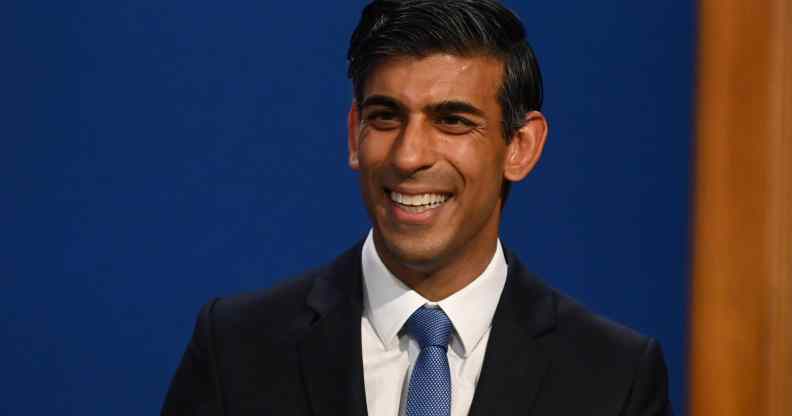Tory cuts jeopardising ‘precarious’ global fight against HIV and AIDS, new report warns

Rishi Sunak. (Toby Melville-WPA Pool/Getty)
Tory aid cuts are set to cause a surge in global HIV transmissions and AIDS-related deaths, politicians and activists have warned.
The foreign aid cuts were introduced by chancellor of the Exchequer Rishi Sunak, who announced in November 2020 that the government would cut its spending of 0.7 per cent of gross national income on official development assistance (ODA) to just 0.5 per cent. In July, 2021, MPs voted in support of ending the 0.7 per cent commitment.
In real terms, this means the government will be spending £4.5 billion less on aid than in 2019.
Earlier this year, the Tory government also slashed funding to agencies like UNAIDS, Unitaid and UNFPA, by over 80 per cent respectively.
This week, STOPAIDS, Frontline AIDS and the All-Party Parliamentary Group (APPG) on HIV and AIDS have released a new report highlighting exactly what these cuts will mean for the fight against HIV and AIDS around the world.
According to the report: “Even before COVID-19, the HIV response was already in a precarious position. COVID-19 is threatening to reverse a decade of progress in the HIV response.
“The global HIV response is now teetering – caught in a perfect storm of waning political and public engagement, diminishing funds, and the global shock of COVID-19.”
While the UK has been “a historic leader” in the global response to HIV and AIDS, now a “renewed leadership from the UK government for the HIV response is desperately needed”, the report says.
While the cuts risk “setting the stage for a resurgence of the [HIV/AIDS] pandemic which will carry a heavy human and financial toll”, as well as threatening the “delivery of key UK government stated development priorities including global health, pandemic preparedness, girls’ education, science and technology, and open societies”, the adverse effects are already being felt within just a few months.
Opportunities have already been lost, the report states, to fund “innovative solutions to complex challenges, such as improving access to HIV services in crisis situations”, for example providing sexual health and HIV/ AIDS resources to “those affected by the deepening fragility in Lebanon, the dire situation in Afghanistan and the related refugee crisis”.
There has also already been “a dangerous scale down of HIV services in the COVID-19 context”, and “abrupt and poorly coordinated cuts” have impacted “many national organisations on the ground as well as UK-based organisations”.
Tory aid cuts ‘could not have come at a worse time’ for global fight against HIV and AIDS
Baroness Barker, vice-chair of the APPG on HIV said: “There couldn’t be a worse time for the government to cut so much funding. Our report highlights the devastating impact that the cuts are already having and how its jeopardising decades of progress.
“Britain is and can be so much better than this. I urge the government to think again. We must save lives and get the HIV response back on track.”
Christine Stegling, executive director of Frontline AIDS, added: “For the most marginalised communities, vulnerable both to AIDS and the impact of COVID-19, these cuts could not have come at a worse time.
“The World Health Organization has confirmed that people living with HIV who contract COVID-19 are at significantly increased risk of developing severe or fatal disease. A funding cut at this scale would have always been disruptive; today, with many communities doubly hit by two pandemics, such cuts are catastrophic.”
The report calls for the UK’s Tory government to reinstate the 0.7 per cent spending commitment, and to use the upcoming spending review “to make supplementary allocations to the critical organisations that faced substantial cuts and put in place plans for sustainable, long-term funding”.

